Local elections 2022: Tories face test on cost of living and Partygate as voting opens across UK – live
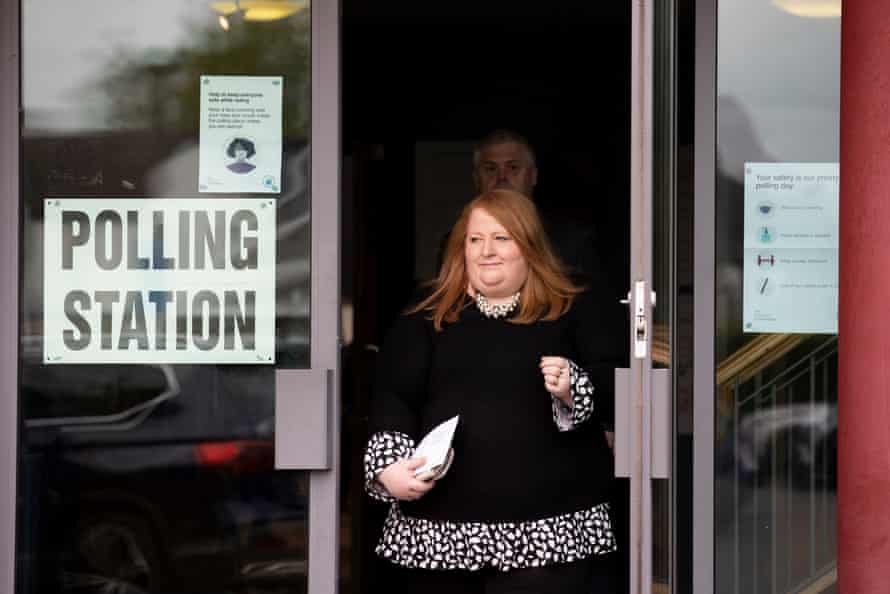
It is probably time for a blast of #dogsatpollingstations.
This is from my colleague Libby Brooks.
This is from Mark Pack, the Lib Dem president.
This is from the writer and sometime Labour activist John O’Farrell.
This is from the Telegraph’s Christopher Hope.
Councils are getting in on the act too. This is from Southampton county council.
This is from Liam Thorp from the Liverpool Echo, who has adapted the genre with a #dogsnotatpollingstations pic.
In Harrogate it’s not just dogs …
And this is from a reader called Carl because, although I don’t normally play requests, why not for once?
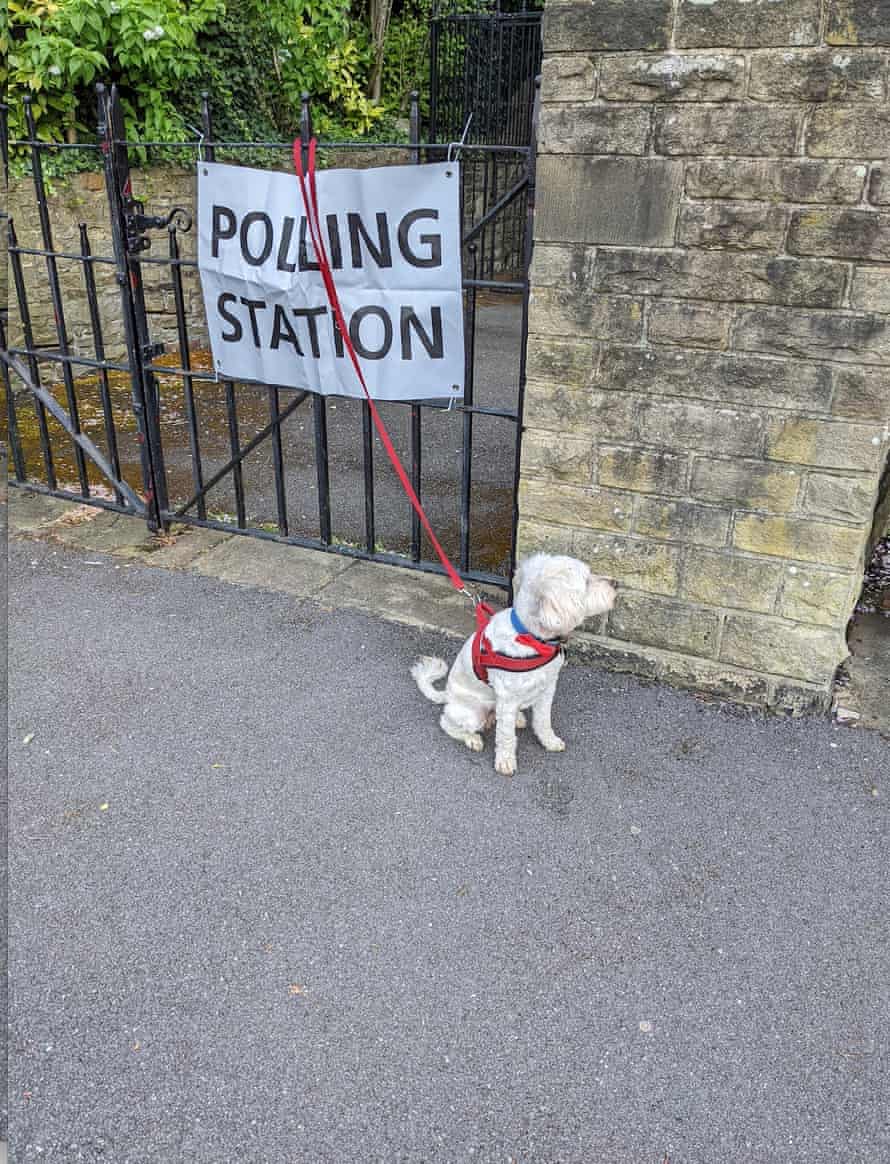

Rory Carroll
If the size of the press pack waiting at her polling station in Coalisland, County Tyrone, is any indicator, Michelle O’Neill is on track to be Northern Ireland’s next first minister. About 20 photographers and TV camera operators greeted Sinn Féin’s leader in the north when she turned up to vote this morning.
Asked by the Guardian about the significance of Northern Ireland possibly getting its first nationalist first minister, O’Neill made no mention of a border poll for a united Ireland and focused on bread-and-butter issues. She said:
It’s a hugely historic election and people are very in tune to that. What we’re asking for people today is come out … and to vote for a first minister that will stand up for everybody, that will turn up on day one for everybody, someone that will invest in people in terms of getting them through the cost of living crisis and that will work to fix the health service.
O’Neill declined to be drawn on the timing of Brandon Lewis’s hint that the government was rowing back from a threat to disapply parts of the Northern Ireland protocol in the Queen’s speech next week. (See 10.25am.) “I’m not going to speculate. The protocol is here to stay, it is our best defence against the hardest Brexit that the DUP and the Tories delivered to us.”
“I think people are determined to see unionism winning in this election,” Sir Jeffrey Donaldson, the DUP leader, said as he voted in Northern Ireland this morning.
That is not what the polls say. The DUP has been the largest party in the Northern Ireland assembly after every set of elections since 2003. But now Sinn Féin has been ahead of the DUP in the polls for months, and one poll this week had Donaldson’s party neck and neck with the Alliance party, implying it might even come third.
Speaking to reporters outside the polling station, Donaldson restated his call for the UK government to act over the Northern Ireland protocol.
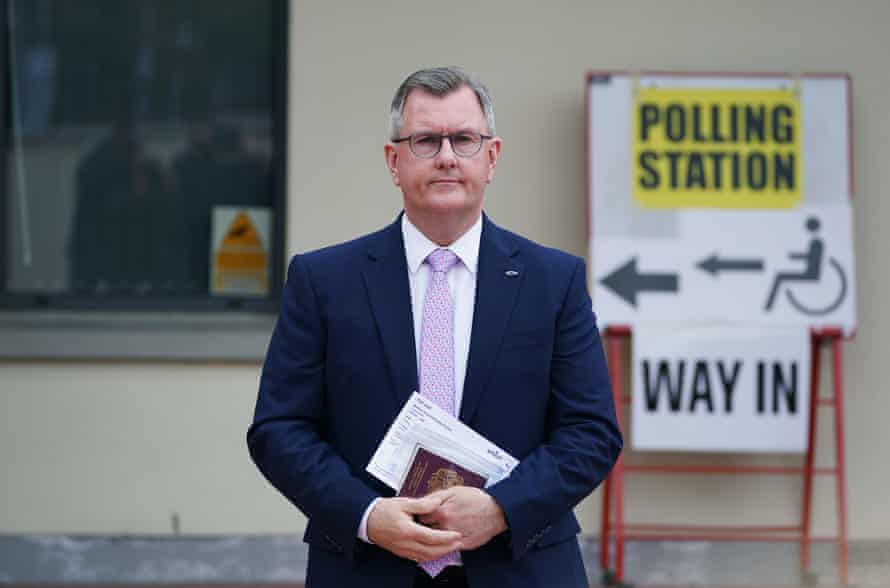
Boris Johnson and the Japanese prime minister watched an RAF flypast together in Horse Guards Parade before their bilateral discussions in No 10, PA Media reports. PA says:
The pair stood on a dais as they witnessed a Voyager and two Typhoon fighter jets soar over St James’s Park and the parade ground.
Fumio Kishida was then invited in Japanese by the captain of the Nijmegen Company, Grenadier Guards, to inspect a guard of honour.
The Japanese leader and Johnson headed to Downing Street afterwards to discuss a new defence deal.
No 10 said the “landmark” reciprocal access agreement would allow the two countries’ forces to deploy together for training, joint exercises and disaster relief.
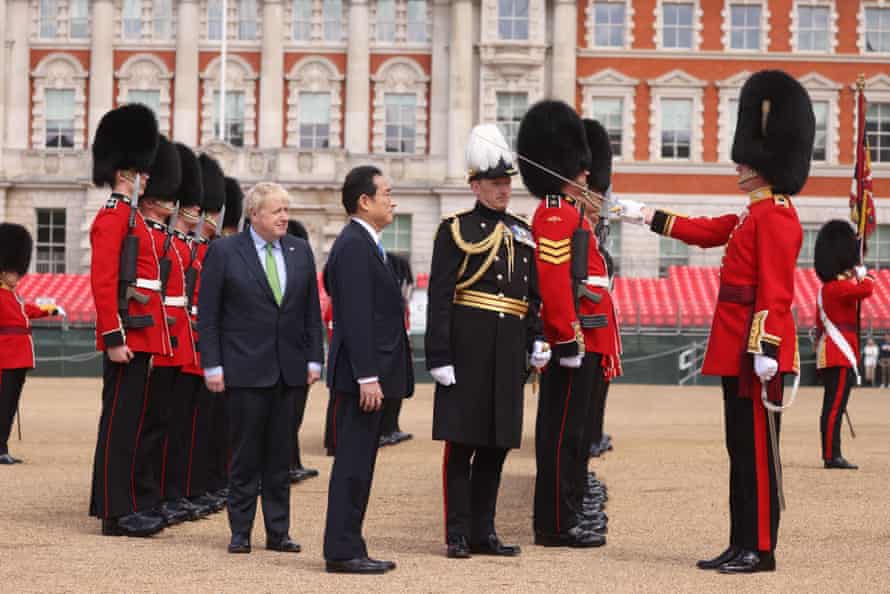
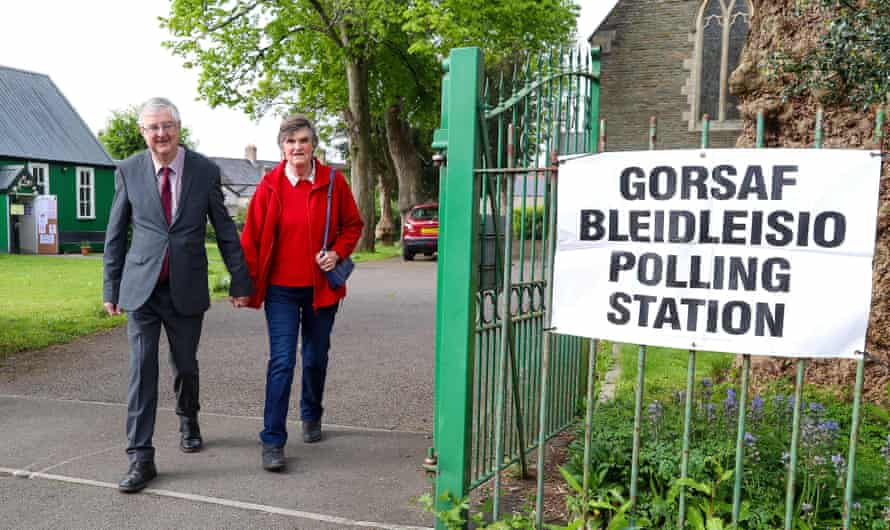
Gains and losses at the local elections – what the experts are forecasting
Last month the Daily Telegraph published the results of a poll suggesting that the Conservatives are on course to lose more than 800 council seats in the local elections. The report was widely dismissed as a Conservative-friendly exercise in expectation management, even though it was based on an analysis by Electoral Calculus, a political consultancy, and the polling firm Find Out Now. The same report claimed Labour was on course to win more than 800 seats.
This week Electoral Calculus revised down the figures for Conservative losses a bit, but it still suggested the party was on course to lose almost 550 seats. It also had Labour on course to win 819 seats.
Yesterday Ben Walker, a data specialist at the New Statesman, published his seat projections, based on an analysis of recent polling. His figures are very different. He expects the Conservatives to lose just over 200 seats, with the Labour gains limited to around 150. He says:
My forecast … predicts that the Conservatives will lose more than 200 council seats across Great Britain on polling day (Thursday 5 May). They will suffer net losses of 63 in London, 38 across the rest of England, 83 in Scotland and 22 in Wales.
Labour, meanwhile, will make a net gain of 35 council seats in London but a net loss of 16 across the rest of England. That net loss, however, will be more than compensated for by net gains of 87 and 41 in Scotland and Wales respectively.
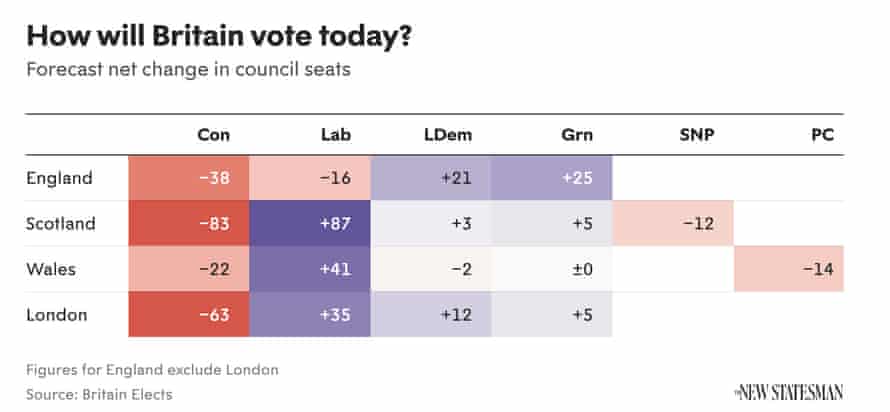
Steve Fisher, an Oxford University academic who works on the team producing the election results analysis used by the BBC, published an alternative seat projection yesterday. His figures are closer to Walker’s than to Electoral Calculus’s; he is forecasting 304 Labour gains, and 281 Tory losses.
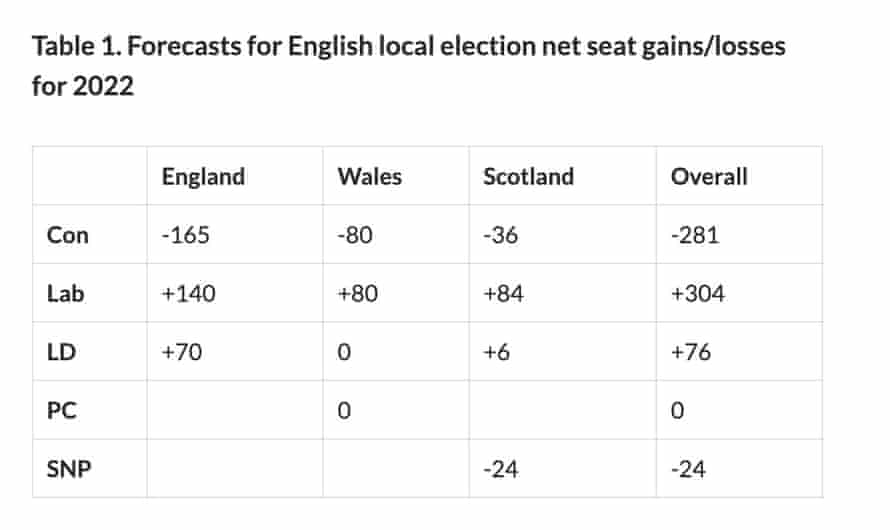
In a blog explaining the figures, Fisher says:
The Conservatives are expected to lose seats in all three countries. They are defending a strong 2017 base in Scotland and Wales, and dropped in the polls since both 2017 and 2018 when the English seats were last fought.
Labour are expected to be the main beneficiaries from Conservative losses. The projections suggest Labour might recover most but not all the losses they suffered in 2017 in Scotland and Wales. In England, Labour are trying this week to build on cumulative gains from 2010, 2014 and 2018. They already control over half the seats up this year. Since Labour are at 40% in the polls, their poll support is no greater than it was in 2018. Instead of gaining seats from winning more voters, Labour are projected to make council seat gains in England primarily from the drop in the Conservative vote. But, as discussed below, last year’s experience shows there are various reasons why that might not happen.
As Prof Sir John Curtice, the country’s leading psephologist (and a colleague of Fisher’s) explained in an interview yesterday, counting seats gained or lost is not necessarily the best way of assessing how parties perform in local elections. Experts pay as much or more attention to the national share of the vote, but this takes longer to calculate.
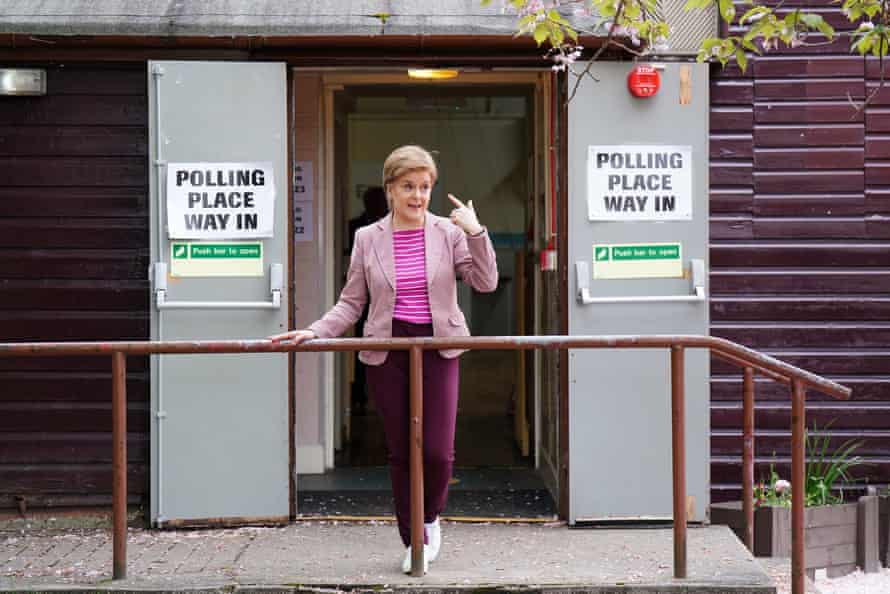
Photograph: Jane Barlow/PA
Bill to overhaul Northern Ireland protocol not likely to be in Queen’s speech, minister hints

Lisa O’Carroll
The government is not expected to include threatened domestic law to disapply parts of the Northern Ireland protocol in the Queen’s speech on 10 May outlining the bills it hopes to introduce in the next year.
The Brexit opportunities minister, Jacob Rees-Mogg, recently promised unilateral changes if the EU did not agree to change the rules on Irish Sea border checks, as did Boris Johnson who said he would “fix” the protocol.
However, last night the Northern Ireland secretary, Brandon Lewis, hinted there would be no such fix in the Queen’s speech, telling ITV’s Peston: “We’ve not said that.” Lewis went on:
Our focus is on resolving the issue of the protocol. Ideally, we want to do that by agreement with the European Union.
EU sources say there could be room for further compromise on the border checks but talks have slowed because of the situation in Ukraine.
It is thought that the government will retain the right to bring forward some changes at a later date in relation to clause 38 (b) in the EU Withdrawal Act 2020, which underlines parliamentary powers in domestic law.
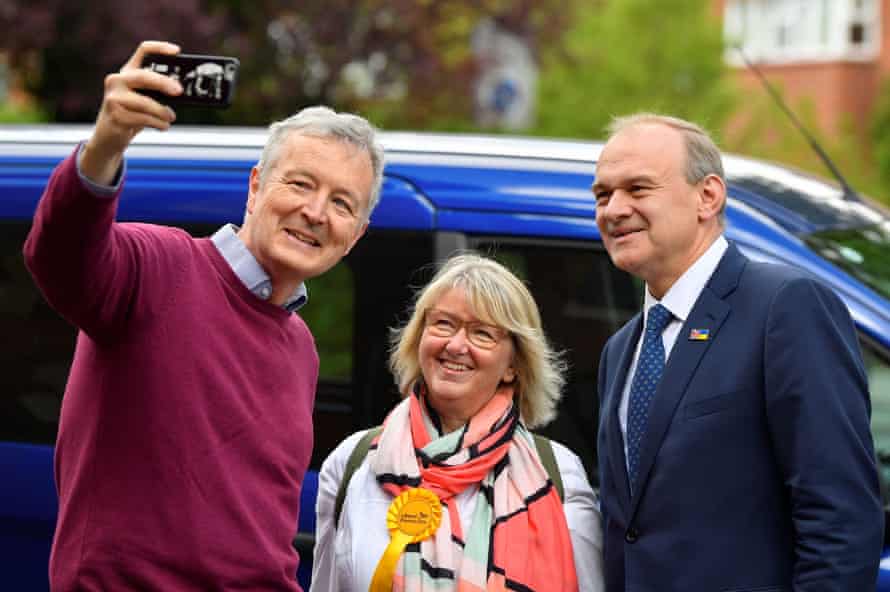
Here is a question from below the line.
Hi Andrew,
Thanks for all you do to keep us informed! Could you please give us a little reminder on what the reporting/journalism laws are on election days? I always find myself forgetting!
Thank you!
As a colleague has already pointed out in the comments, it is illegal to publish information about how people have voted while the polls are still open.
The law (section 66A of the 1983 Representation of the People Act) is intended to stop people publishing exit polls before all voting has finished. But the legislation is worded in such a way as to cover, say, a reporter interviewing people at polling stations, and publishing a “vox pop” article about how voting is going. In theory it also covers comments BTL about how people have voted.
The act says it is summary offence, punishable by a maximum of six months imprisonment or a level 5 fine, to publish before the poll is closed:
- Any statement relating to the way in which voters have voted at the election where that statement is (or might reasonably be taken to be) based on information given by voters after they have voted, or
- Any forecast as to the result of the election which is (or might reasonably be taken to be) based on information so given.
Keir Starmer arrived at a polling station in Kentish Town, north London, to cast his vote in the local elections for Camden council, PA Media reports. PA says:
The Labour leader, who lives in Kentish Town, which is part of the borough of Camden, held hands with his wife as he walked into the polling station – a community hall in Willingham Close – just after 9.30am. He said “Good morning” to the photographers and staff at the door.
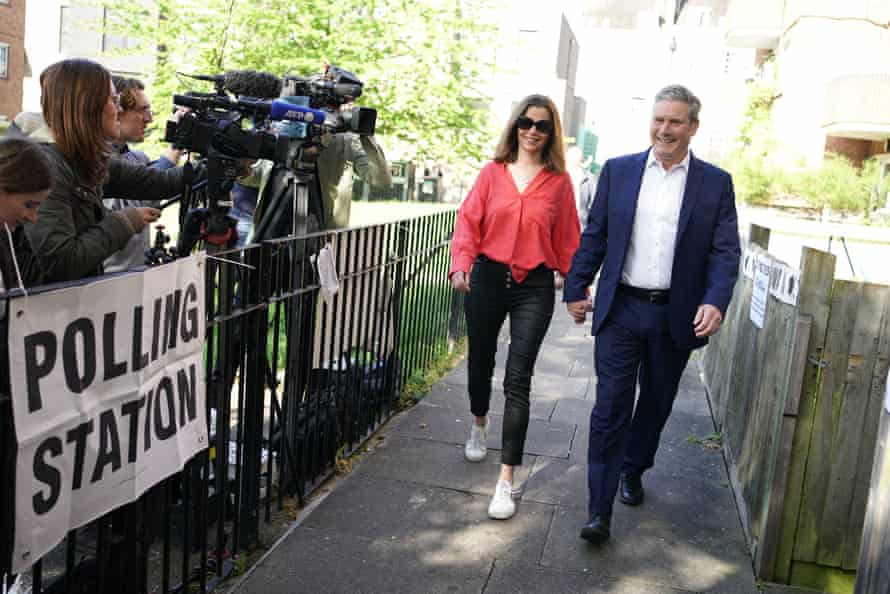
Shell profits soar to $9.1bn amid calls for windfall tax
Shell has reported a record quarterly profit of $9.1bn (£7.3bn) for the first three months of the year, piling more pressure on the government to implement a windfall tax to fund measures to tackle soaring household energy bills. My colleague Alex Lawson has the story here.
Poll suggests key Tory council Wandsworth could fall to Labour for first time in more than 40 years as voting begins
Good morning. Voters have already started going to the polls across the UK in elections that could determine whether or not the Conservative party decides to stick with Boris Johnson as its leader, that will almost certaintly see Sinn Féin, the republican party committed to a united Ireland, become the largest party in the Northern Ireland assembly for the first time, triggering a crisis in unionism, and that will provide that will provide the best indication to date as to whether Labour is on course to win the next general election.
Last night YouGov published some new polling looking at what might happen in 16 key councils in England. In his analysis, YouGov’s Patrick English wrote:
Our models suggest that while Labour will make gains up and down England, they will find their pace of growth to be much slower in some areas of the country than others.
Overall, the story is fairly consistent – we expect swings of varying sizes from the Conservatives to Labour in all areas, and also some notable improvements for the Greens and independent/smaller party candidates. However, the Conservative vote seems to be holding up better in some areas of England than others, and this will impact the pattern of results on the night.
YouGov forecast: Labour set to win council seats across key battlegrounds, but progress will be slower in some areas than others.
Our model suggests they will make healthy seat gains tomorrow, but council wins may be harder to come byhttps://t.co/o54fO32ABS pic.twitter.com/znARy2x5aB
— YouGov (@YouGov) May 4, 2022
Sam Coates from Sky presents the results in a different format, region by region, which illustrates more vividly how Labour is on course to do well in London and the south, but struggle more in the north.
Exclusive: YouGov model results for 16 key council races
First up London: YouGov say Wandsworth voters “leaning” Labour and they might pick up others reaching new highs compared to 2018 pic.twitter.com/XvIeL8gEsB
— Sam Coates Sky (@SamCoatesSky) May 4, 2022
Then the South of England
Southampton leaning Labour say YouGov – which would be a big win – but other councils like Crawley which ought to be on a Labour wish list too close to call pic.twitter.com/QxN2EkkFp9
— Sam Coates Sky (@SamCoatesSky) May 4, 2022
Finally the north of England
Current Labour controlled councils only now “leaning” Labour with little sign of change in key red wall councils, say YouGov. Labour Hull “too close to call” pic.twitter.com/NRYyfFpciM
— Sam Coates Sky (@SamCoatesSky) May 4, 2022
Still, for Labour to win Wandsworth, which the YouGov poll suggests is possible, would be significant. The south-west London council has been in Conservative hands since 1978 and it was sometimes described as Margaret Thatcher’s favourite local authority. In a particularly bad set of local elections for the Tories in 1990, the party successfully spun a line to the media that, because Wandsworth had stayed blue, it had not all been a disaster. For almost 20 years the council was then run by Eddie Lister, who went on to serve as Boris Johnson’s chief of staff. The YouGov poll also suggests the Tories could lose Westminster, the council covering Downing Street, the Houses of Parliament and Buckingham Palace, which has been Conservative since it was set up in 1964. That would be an even bigger gain for Labour – although, in an excellent ward-by-ward analysis of the contest at On London, Dave Hill concludes a Tory defeat is unlikely.
My colleague Archie Bland has a good preview of what to look out for in the elections in his First Edition briefing.
Boris Johnson has already voted. He turned up at a polling station in Westminster with Dilyn, providing today’s first example of #dogsatpollingstations.
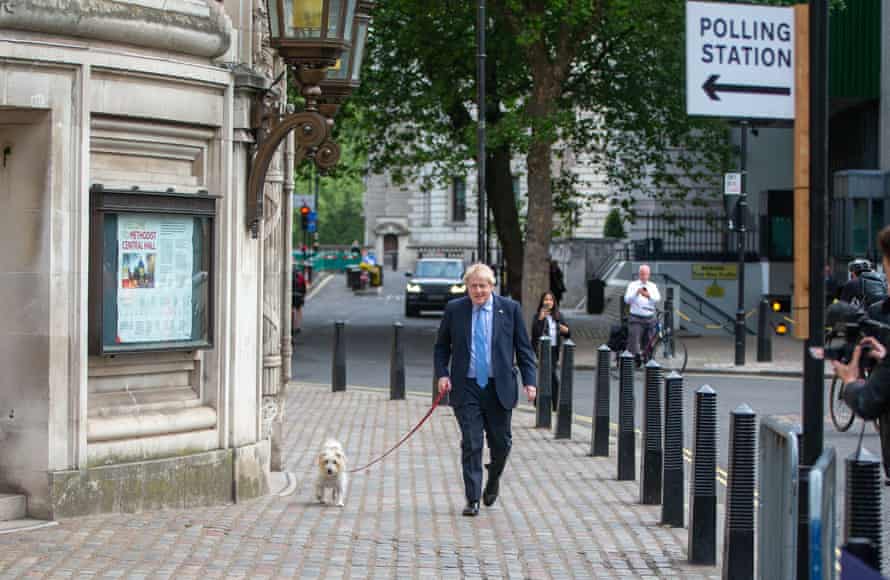
Often on election day #dogsatpollingstations is as good as it gets in terms of news, because broadcasters don’t show political interviews while the polls are open, and there are legal limits to what the media can report in terms of how the voting is going. But I’m sure we’ll find something to fill the blog.
The polls are open until 10pm, when we will be launching a new blog to cover the results coming in overnight. Many councils do not count until Friday, which is also when counting starts in Northern Ireland.
I try to monitor the comments below the line (BTL) but it is impossible to read them all. If you have a direct question, do include “Andrew” in it somewhere and I’m more likely to find it. I do try to answer questions, and if they are of general interest, I will post the question and reply above the line (ATL), although I can’t promise to do this for everyone.
If you want to attract my attention quickly, it is probably better to use Twitter. I’m on @AndrewSparrow.
Alternatively, you can email me at [email protected].
[ad_2]
Share this news on your Fb,Twitter and Whatsapp
Times News Network:Latest News Headlines
Times News Network||Health||New York||USA News||Technology||World News